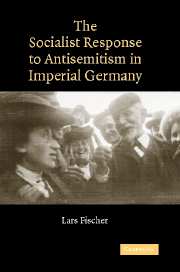Book contents
- Frontmatter
- Contents
- Preface
- Acknowledgements
- Acronyms
- Introduction
- 1 Social Democracy's Stance on Antisemitism and the Spectre of ‘Philosemitism’
- 2 The Influence of ‘Zur Judenfrage’ on the Socialist Movement
- 3 The Socialist Uses and Abuses of ‘Zur Judenfrage’
- 4 The Social Democratic Party Congress of 1903 and the Case of Hans Leuß
- 5 The Former Antisemite Leuß on Antisemitism and ‘the Jewish Question’
- 6 Antisemitism and ‘the Jewish Question’ in Dresden
- 7 The Evolution of Bernstein's Stance on Antisemitism and ‘the Jewish Question’
- Conclusion
- Select bibliography
- Index
5 - The Former Antisemite Leuß on Antisemitism and ‘the Jewish Question’
Published online by Cambridge University Press: 15 December 2009
- Frontmatter
- Contents
- Preface
- Acknowledgements
- Acronyms
- Introduction
- 1 Social Democracy's Stance on Antisemitism and the Spectre of ‘Philosemitism’
- 2 The Influence of ‘Zur Judenfrage’ on the Socialist Movement
- 3 The Socialist Uses and Abuses of ‘Zur Judenfrage’
- 4 The Social Democratic Party Congress of 1903 and the Case of Hans Leuß
- 5 The Former Antisemite Leuß on Antisemitism and ‘the Jewish Question’
- 6 Antisemitism and ‘the Jewish Question’ in Dresden
- 7 The Evolution of Bernstein's Stance on Antisemitism and ‘the Jewish Question’
- Conclusion
- Select bibliography
- Index
Summary
Leuß certainly made a concerted effort to present himself as a reformed character. Yet in this quest to reinvent himself, attempts to demonstrate an actual change in his notions regarding ‘the Jews’ did not feature prominently. In this respect, Leuß's approach differed markedly from that of his friend, Hellmut von Gerlach, who repeatedly discussed his defection from organised political antisemitism. For Gerlach, the reasons leading to his change in attitude (and not just in party-political affiliation) were part and parcel of that discussion. That said, Gerlach's ‘conversion narratives’ all date from the 1920s and 1930s and it is fairly obvious that they were meant as a commentary on the renewed rise of political antisemitism in the Weimar period and the emergence of National Socialism. The escalation of the Weimar years brought with it the beginnings of a fundamental sea change in perceptions of antisemitism. The prevalent emphasis on its futility, disingenuousness and ludicrousness gradually began to give way to an increasing recognition of the serious threat it might pose. To be sure, all too many still did not get it but some did begin to develop an inkling of what was at stake. One of them, as we will see in Chapter 7, was Eduard Bernstein. Gerlach too was among them. In this light, his ability to change his orientation took on an entirely different significance.
- Type
- Chapter
- Information
- The Socialist Response to Antisemitism in Imperial Germany , pp. 135 - 148Publisher: Cambridge University PressPrint publication year: 2007



